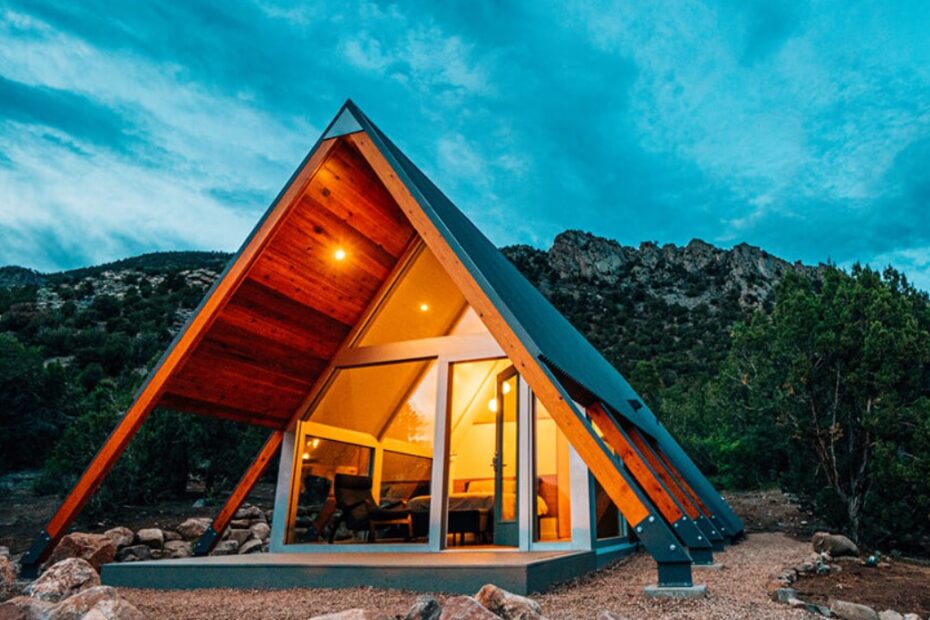Veterans Affairs (VA) loans are a unique and valuable benefit for veterans and active-duty service members. However, when it comes to purchasing tiny homes, many wonder Does VA Loan Cover Tiny Homes? The short answer is, that it depends on various factors, including the home’s specifications and the lender’s policies.
Key Takeaways
- VA loans can potentially be used for tiny homes.
- Specific requirements must be met, including property type and lender approval.
- Understanding VA loan eligibility and tiny home regulations is essential.
Does VA Loan Cover Tiny Homes?
Yes, VA loans can cover tiny homes, but there are specific requirements that must be met. The tiny home must be classified as real property, meaning it should be affixed to a permanent foundation, and it must adhere to local building codes and VA’s Minimum Property Requirements. Additionally, finding a lender who is willing to finance a tiny home with a VA loan is essential.
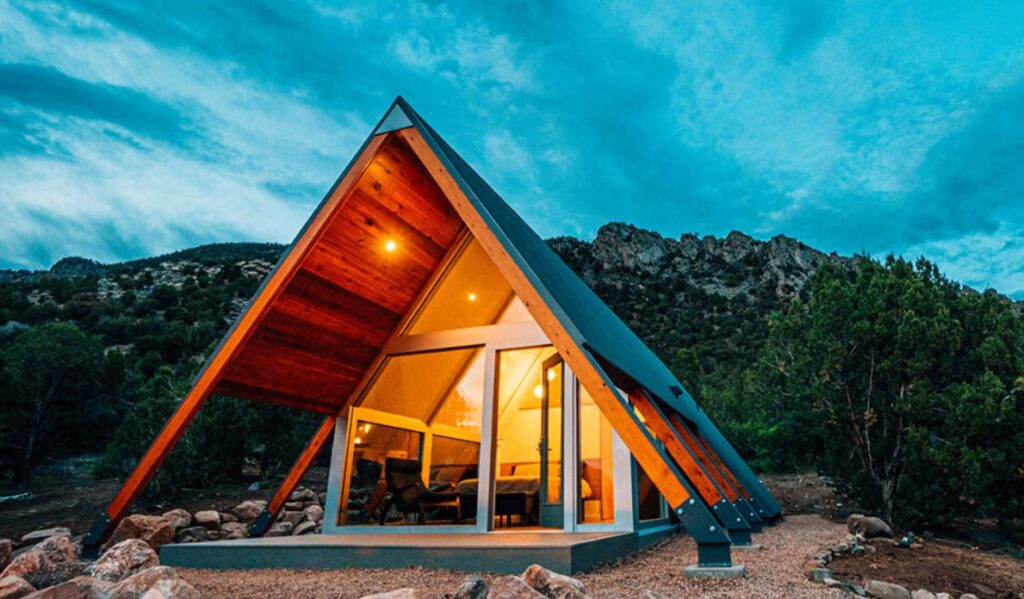
Eligibility and Requirements for VA Loans
VA Loan Basics
A VA loan is a mortgage loan in the United States guaranteed by the Department of Veterans Affairs. The program is for American veterans, military members currently serving in the U.S. military, reservists, and select surviving spouses. VA loans offer several advantages, such as no down payment, no mortgage insurance, and flexible credit requirements.
Requirements for Tiny Homes
When considering a tiny home, VA loan eligibility hinges on the property meeting certain criteria. The home must be classified as real property, meaning it must be affixed to a permanent foundation and meet local building codes and zoning requirements. The unique nature of tiny homes often requires additional scrutiny to ensure they adhere to these standards.
Property Types Covered Under VA Loans
Traditional Homes and Condos
VA loans are typically used for purchasing or refinancing traditional homes, including single-family homes, condos, and manufactured homes. These properties must meet VA and local guidelines to ensure they are safe, sanitary, and structurally sound.
Tiny Homes and VA Loan Compatibility
For tiny homes, the situation is more nuanced. While the VA does not explicitly exclude tiny homes, they must meet the same criteria as traditional homes. This includes being affixed to a permanent foundation and passing all relevant inspections. Lenders also play a crucial role in determining whether they’re willing to finance a tiny home with a VA loan.
Financing Options for Tiny Homes
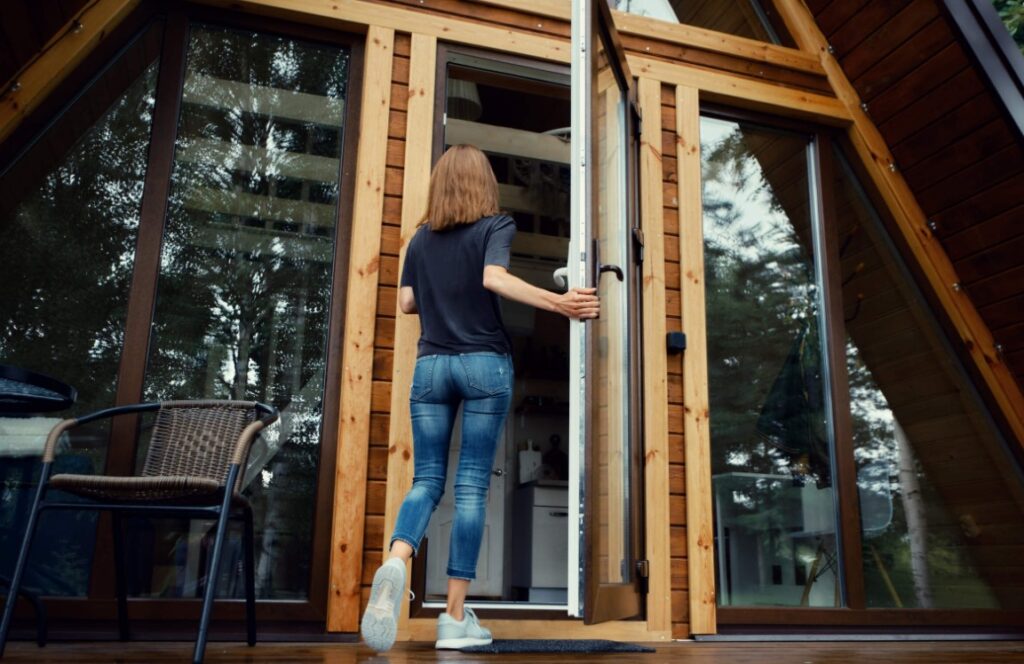
Traditional VA Loans
Traditional VA loans are an option for financing tiny homes if they meet the necessary criteria. However, lenders might have differing policies regarding loan amounts and property types, which can affect eligibility for tiny home financing.
Alternatives to VA Loans
If a tiny home does not meet the VA loan criteria, other financing options include personal loans, manufacturer financing, or traditional mortgages. Each option has its own set of pros and cons that should be carefully considered.
Challenges and Considerations
Zoning and Legal Issues
One of the primary challenges in financing tiny homes, whether through VA loans or other means, is navigating zoning laws and building codes. These regulations vary significantly by location and can impact the feasibility of placing a tiny home on a property.
Market Value and Resale Concerns
Another consideration is the market value and resale potential of tiny homes. Since they are a relatively new concept in housing, their long-term value and market acceptance are still uncertain, which can impact financing decisions.
Understanding Lender Discretion
While the VA sets broad guidelines for loan eligibility, individual lenders have significant discretion in approving loans for specific property types, including tiny homes.
This means that some lenders may be more open to financing tiny homes under a VA loan than others. Veterans should shop around and discuss their tiny home plans with multiple lenders to find the most favorable terms and conditions.
Importance of Loan Officer Expertise
Working with a loan officer who has experience in tiny home financing can be beneficial. These professionals can provide insights into the unique challenges and requirements of securing a VA loan for a tiny home. They can also assist in navigating the application process, ensuring all necessary documentation and property specifications are met.
Tiny Home Builders and VA Loan Compatibility
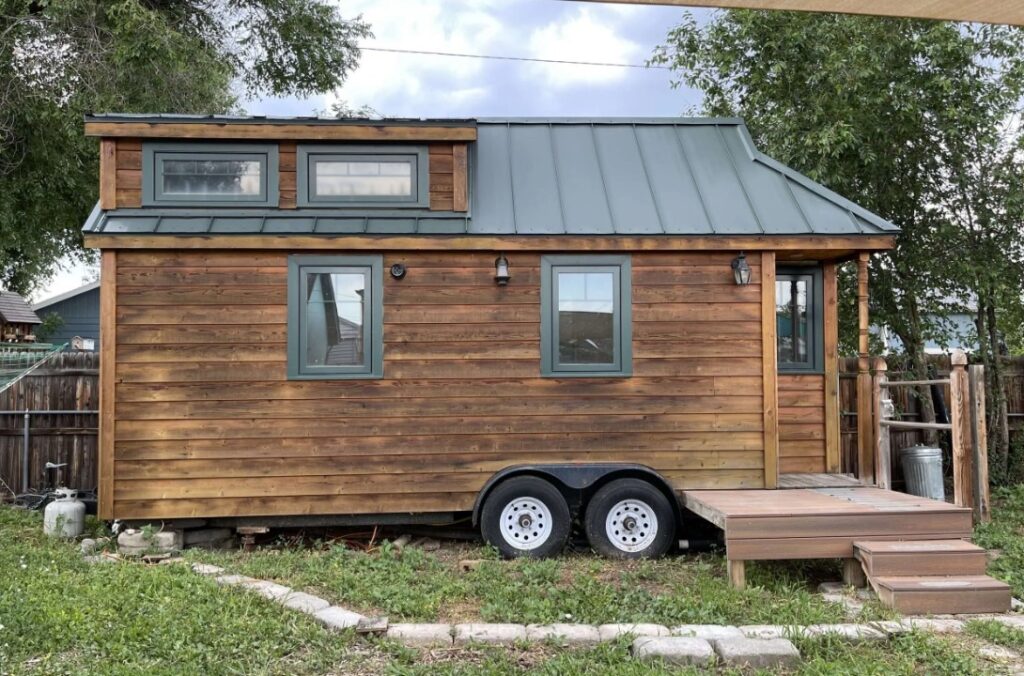
Builder Certifications and VA Requirements
To qualify for a VA loan, tiny homes often need to be built by certified builders who adhere to specific construction standards. Veterans should verify that the tiny home builder is familiar with VA loan requirements, including necessary certifications and building codes. This ensures that the tiny home will be eligible for financing and meets the quality standards set by the VA.
Customization and Compliance
Many tiny home builders offer customization options, allowing veterans to tailor their homes to their specific needs. However, it’s crucial to ensure that these customizations still comply with the standards required for VA loan approval. Discussing these details with both the builder and the lender can prevent any compliance issues that might arise during the loan approval process.
The Future of Tiny Homes and VA Loans
Trends in Tiny Home Living
The tiny home movement is gaining momentum, with more people seeking sustainable, affordable, and minimalist living options. This trend is likely to influence lenders and policymakers in the future, potentially leading to more standardized guidelines for financing tiny homes, including those purchased with VA loans.
Potential Policy Changes
As the popularity of tiny homes grows, there may be future changes to VA loan policies to accommodate this emerging housing option more explicitly. Veterans and advocates of tiny home living are encouraged to stay informed about potential policy updates that could impact the financing of tiny homes through VA loans.
Tiny Homes as a Sustainable Option for Veterans
Environmental Benefits
Tiny homes are often celebrated for their environmental benefits, including reduced energy consumption and smaller ecological footprints. Veterans interested in sustainable living may find tiny homes an attractive option, aligning with their values and lifestyle preferences.
Long-Term Financial Savings
Despite the initial challenges in financing, tiny homes can offer long-term financial savings through reduced living expenses, such as lower utility bills and maintenance costs.
For veterans on a fixed income or those seeking to maximize their financial resources, tiny homes can be a practical and economical choice.
Preparing for a Tiny Home Purchase with a VA Loan
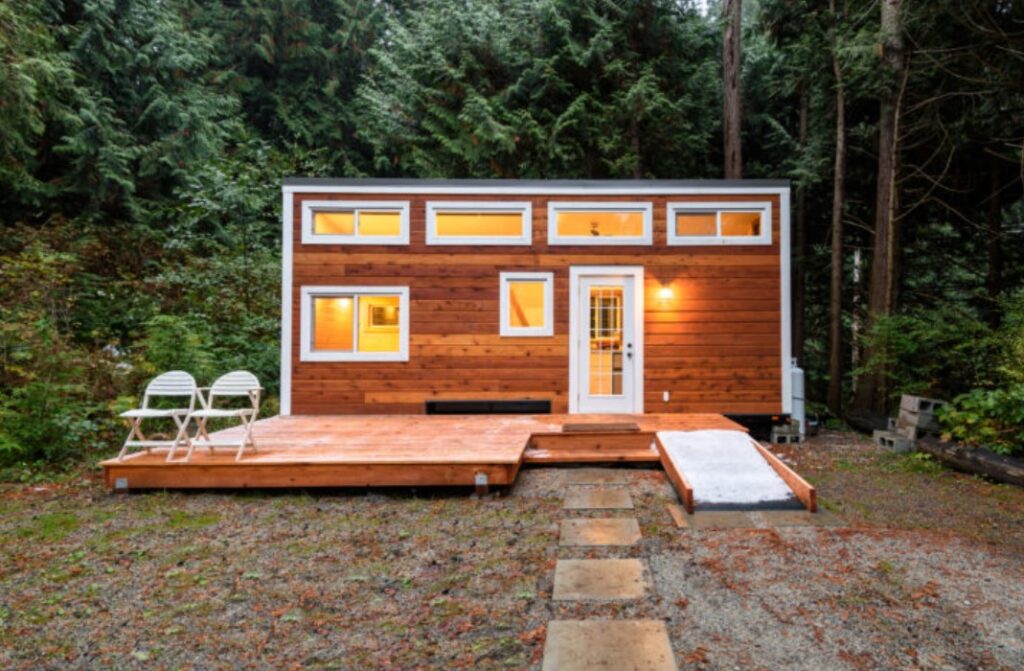
Financial Planning and Budgeting
Veterans considering a tiny home purchase with a VA loan should start with thorough financial planning. This includes understanding the total costs involved, from the purchase price to any necessary modifications for VA loan compliance. Budgeting for these expenses upfront can ensure a smoother financing process.
Seeking Expert Advice
Consulting with financial advisors, real estate experts, and VA loan specialists can provide valuable guidance in the tiny home purchasing process. These professionals can offer insights into the best practices for securing financing and navigating the unique aspects of tiny home ownership.
Tiny Homes And VA Minimum Property Requirements
When considering tiny homes under VA loans, understanding the VA’s Minimum Property Requirements (MPR) is crucial. These requirements ensure that the property is safe, sanitary, structurally sound, and meets all applicable building codes. For tiny homes, this includes:
- Permanent Foundation: The home must be affixed to a permanent foundation.
- Building Codes and Zoning Laws: The property must adhere to all local and state building codes and zoning laws.
- Basic Living Needs: The home should have essential living facilities, including sleeping, cooking, and bathroom areas.
- Size and Space Requirements: While there’s no specific size requirement, the home must be large enough to ensure a suitable living environment.
- Utility Services: The home must have access to water, sewage, electricity, and other necessary utilities.
Meeting these MPRs can be challenging for tiny homes, especially those designed to be mobile or off-grid. It’s important for veterans interested in purchasing a tiny home with a VA loan to work with builders and lenders familiar with these requirements.
Are Tiny Homes A Good Idea?
The decision to invest in a tiny home depends on individual preferences, lifestyle, and financial goals. Here are some considerations:
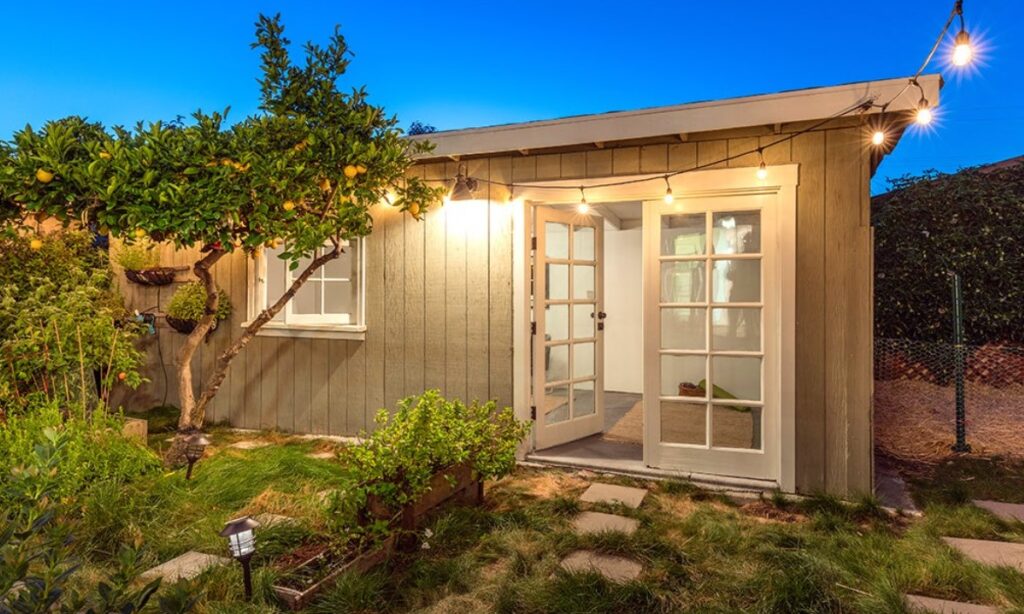
- Affordability and Cost-Saving: Tiny homes are often more affordable than traditional homes, potentially offering cost savings on utilities, taxes, and maintenance.
- Sustainability and Eco-Friendliness: Many tiny homes are built with eco-friendly materials and designs, appealing to those seeking a sustainable lifestyle.
- Mobility and Flexibility: For tiny homes on wheels, the ability to relocate easily can be attractive. However, mobility is limited if you’re using a VA loan, as the home must be affixed to a permanent foundation.
- Space Limitations: While promoting minimalist living, tiny homes come with space constraints, which might be challenging for families or those with significant belongings.
- Resale Value and Market Acceptance: The tiny home market is still emerging, and its long-term value remains uncertain. This can affect the resale value and financing options.
Is It Possible To Buy A Tiny Home With A VA Loan?
Buying a tiny home with a VA loan is possible, but it requires navigating specific criteria set by the Department of Veterans Affairs. The key factors that determine eligibility include:
- Property Classification: The tiny home must be classified as real property, meaning it should be affixed to a permanent foundation.
- Compliance with Local and VA Standards: The home must adhere to local building codes and VA’s Minimum Property Requirements (MPR).
- Lender Willingness: Not all lenders may be willing to finance a tiny home with a VA loan. It’s important to find a lender who is familiar with both VA loans and tiny home financing.
Given these criteria, veterans interested in purchasing a tiny home with a VA loan should start by consulting with VA-approved lenders and ensuring the property meets all necessary requirements.
What Are Monthly Payments On A Tiny House?
The monthly payments on a tiny house depend on several factors:
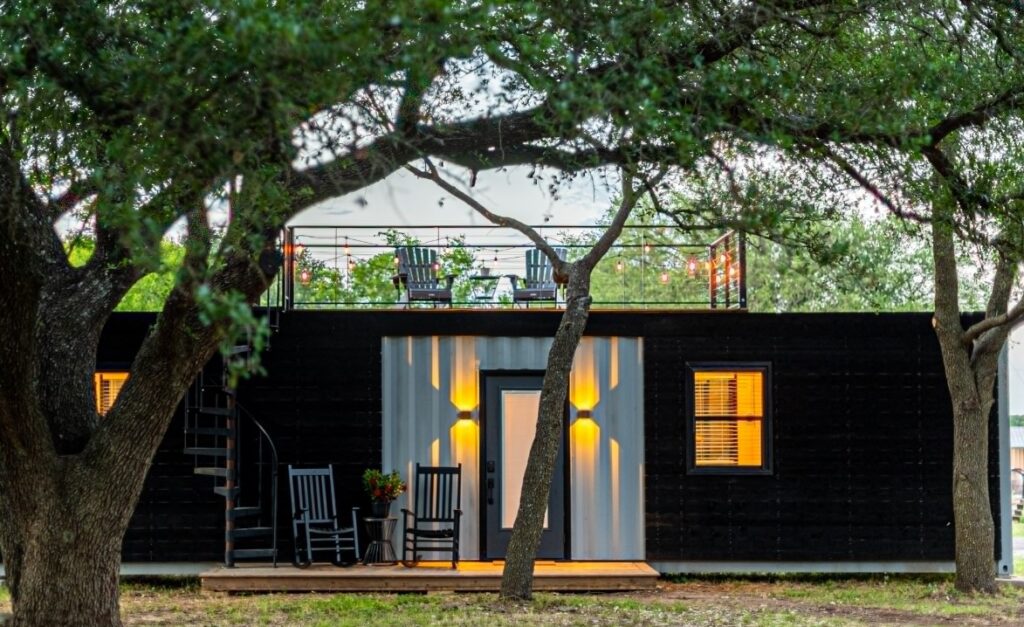
- Loan Amount: This is influenced by the purchase price of the tiny home and any down payment made. Tiny homes generally cost less than traditional homes, which can result in lower loan amounts.
- Interest Rate: The interest rate on the loan will affect the monthly payment. VA loans typically offer competitive interest rates.
- Loan Term: The length of the loan also plays a role. A longer loan term means lower monthly payments but more interest paid over time.
- Other Costs: Insurance, taxes, and maintenance costs should also be considered as part of the monthly expenses.
To estimate monthly payments, it’s advisable to use a mortgage calculator and input these variables. This can provide a clearer picture of what to expect in terms of financial commitment.
What Type Of Homes Can A VA Loan Be Used For?
VA loans, a benefit for veterans and active service members, offer flexibility in the types of homes that can be purchased. The common types of homes eligible for VA loans include:
- Single-Family Homes: These are the most typical properties financed with VA loans, provided they meet the VA’s safety and livability standards.
- Condominiums: Condos can be financed with VA loans if they are in VA-approved developments.
- Manufactured Homes: These homes, including modular homes, are eligible for VA loans but must be affixed to a permanent foundation and meet certain construction standards.
- Multi-Unit Properties: Veterans can use VA loans for properties with up to four units, as long as one of the units is their primary residence.
All these properties must meet the VA’s Minimum Property Requirements, ensuring they are safe, structurally sound, and sanitary.
Can You Use A VA Loan For A Tiny Home?
Yes, it is possible to use a VA loan for a tiny home, but with specific considerations and requirements:
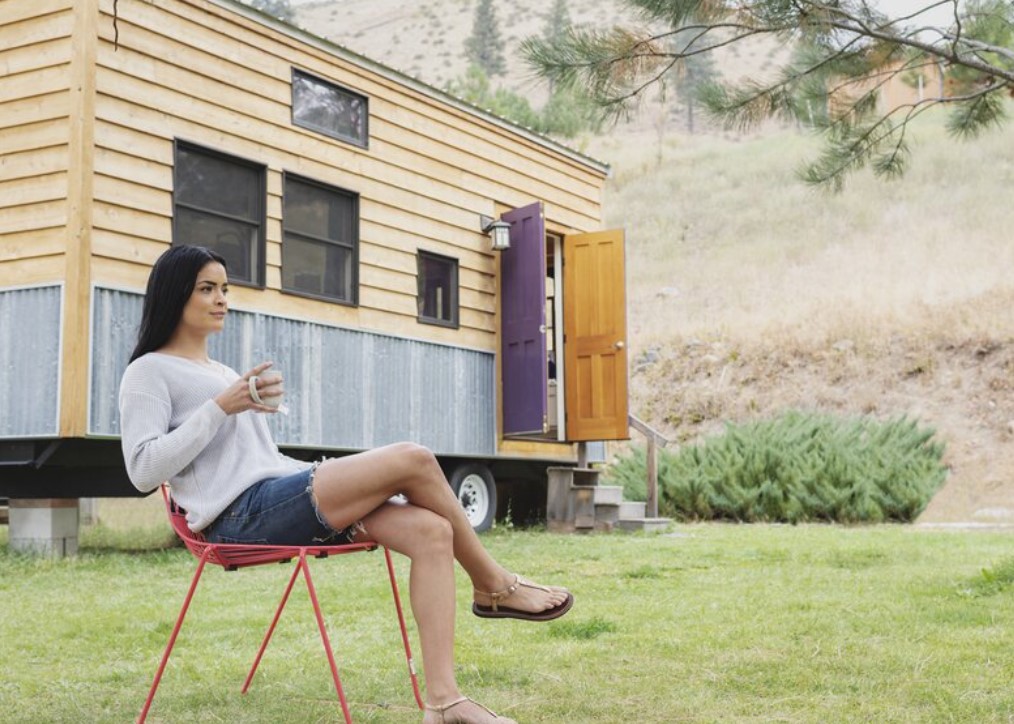
- Property Standards: The tiny home must adhere to the VA’s Minimum Property Requirements and be classified as real property.
- Permanent Foundation: The home must be affixed to a permanent foundation, which can be a challenge for tiny homes designed to be mobile.
- Local Building Codes: Compliance with local and state building codes and zoning laws is essential.
- Lender Approval: Finding a lender willing to finance a tiny home with a VA loan is crucial, as not all lenders may be comfortable with this type of property.
Thus, while VA loans can be used for tiny homes, veterans need to ensure that all the specific criteria are met and work closely with both lenders and builders to navigate this process.
Conclusion
In conclusion, while VA loans may cover tiny homes, there are several factors to consider. These include the home’s compliance with property standards, lender policies, and local regulations.
Veterans interested in tiny homes should thoroughly research their options and consult with lenders to understand the best path forward. With careful planning and understanding of the requirements, financing a tiny home with a VA loan can be a viable option.
Top FAQ’s
Can I use a VA loan to buy a pre-built tiny home?
Yes, you can use a VA loan to buy a pre-built tiny home, provided it meets VA guidelines. This includes being affixed to a permanent foundation and classified as real property. The builder must also comply with VA construction standards and local building codes.
Can I use a VA loan to refinance a tiny home I already own?
Yes, VA loans can be used to refinance an existing tiny home mortgage, provided the home meets all VA loan requirements. This includes being affixed to a permanent foundation and classified as real property.
What happens if my tiny home doesn’t appraise for the purchase price?
If a tiny home doesn’t appraise for the purchase price, options include renegotiating the sale price, making a larger down payment to cover the difference, or choosing another property. The VA loan won’t cover more than the appraised value.
What are the insurance requirements for a tiny home purchased with a VA loan?
Tiny homes financed through VA loans must have insurance coverage like any other home. This includes hazard insurance and, depending on the location, flood insurance. Insurance policies for tiny homes might differ, so it’s crucial to discuss options with an insurance provider.
Can I place a VA-financed tiny home on rented land?
Yes, but there are considerations. The tiny home must be permanently affixed to the land and meet local zoning laws. The lease terms should also be long enough to satisfy the loan’s lifespan, and the lender must approve the arrangement.
A multifaceted professional, Muhammad Daim seamlessly blends his expertise as an accountant at a local agency with his prowess in digital marketing. With a keen eye for financial details and a modern approach to online strategies, Daim offers invaluable financial advice rooted in years of experience. His unique combination of skills positions him at the intersection of traditional finance and the evolving digital landscape, making him a sought-after expert in both domains. Whether it’s navigating the intricacies of financial statements or crafting impactful digital marketing campaigns, Daim’s holistic approach ensures that his clients receive comprehensive solutions tailored to their needs.
